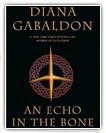Outlander aka Cross Stitch - Gabaldon Diana (библиотека электронных книг txt) 📗
I told her of seeing Laoghaire on the stair below Colum’s study, and the conclusions I had come to.
Geilie snorted.
“Pah! She heard Colum and Dougal talking about me; that’s what made her blench – she’d think Colum had heard she’d been to me for the ill-wish. He’d have her whipped to bleeding for that; he doesna allow any truck wi’ such arts.”
“You gave her the ill-wish?” I was staggered.
Geilie drew herself sharply away at this.
“I didn’t give it to her, no. I sold it to her.”
I stared, trying to meet her eyes through the gathering darkness.
“There’s a difference?”
“Of course there is.” She spoke impatiently. “It was a matter of business, was all. And I don’t give away my customers’ secrets. Besides, she didna tell me who it was meant for. And you’ll remember that I did try to warn ye.”
“Thanks,” I said with some sarcasm. “But…” my brain was churning, trying to rearrange my ideas in light of this new information. “But if she put the ill-wish in my bed, then it was Jamie she wanted. That would explain her sending me to your house. But what about Dougal?”
Geilie hesitated for a moment, then seemed to come to some decision.
“The girl’s no more wi’ child by Dougal MacKenzie than you are.”
“How can you be so sure?”
She groped for my hand in the darkness. Finding it, she drew it close and placed it squarely on the swelling bulge beneath her gown.
“Because I am,” she said simply.
“Not Laoghaire then,” I said. “You.”
“Me.” She spoke quite simply, without any of her usual affectation. “What was it Colum said – ‘I’ll see that she’s done rightly by’? Well, I suppose this is his idea of a suitable disposal of the problem.”
I was silent for a long time, mulling things over.
“Geilie,” I said at last, “that stomach trouble of your husband’s…”
She sighed. “White arsenic,” she said. “I thought it would finish him before the child began to show too much, but he hung on longer than I thought possible.”
I remembered the look of mingled horror and realization on Arthur Duncan’s face as he burst out of his wife’s closet on the last day of his life.
“I see,” I said. “He didn’t know you were with child until he saw you half-dressed, the day of the Duke’s banquet. And when he found out… I suppose he had good reason to know it wasn’t his?”
There was a faint laugh from the far corner.
“The saltpeter came dear, but it was worth every farthing.”
I shuddered slightly, hunched against the wall.
“But that’s why you had to risk killing him in public, at the banquet. He would have denounced you as an adulteress – and a poisoner. Or do you think he realized about the arsenic?”
“Oh, Arthur knew,” she said. “He wouldna admit it, to be sure – not even to himself. But he knew. We’d sit across the board from each other at supper, and I’d ask, ‘Will ye have a bit more o’ the cullen skink, my dear?’ or ‘A sup of ale, my own?’ And him watching me, with those eyes like boiled eggs, and he’d say no, he didna feel himself with an appetite just then. And he’d push his plate back, and later I’d hear him in the kitchen, secret-like, gobbling his food standing by the hutch, thinking himself safe, because he ate no food that came from my hand.”
Her voice was light and amused as though she had been recounting some bit of juicy gossip. I shuddered again, drawing away from the thing that shared the darkness with me.
“He didna guess it was in the tonic he took. He’d take no medicine I made; ordered a patent tonic from London – cost the earth too.” Her voice was resentful at the extravagance. “The stuff had arsenic in it to start; he didna notice any difference in the taste when I added a bit more.”
I had always heard that vanity was the besetting weakness of murderers; it seemed this was true, for she went on, ignoring our situation in the pride of recounting her accomplishments.
“It was a bit risky, to kill him before the whole company like that, but I had to manage something quickly.” Not arsenic, either, to kill like that. I remembered the fiscal’s hard blue lips and the numbness of my own where they had touched him. A quick and deadly poison.
And here I had thought that Dougal was confessing to an affair with Laoghaire. But in that case, while Colum might be disapproving, there would have been nothing to prevent Dougal marrying the girl. He was a widower, and free.
But an adulterous affair, with the wife of the fiscal? That was a different kettle of fish for all concerned. I seemed to recall that the penalties for adultery were severe. Colum could hardly smooth over an affair of that magnitude, but I couldn’t see him condemning his brother to public whipping or banishment. And Geilie might well consider murder a reasonable alternative to being burnt on the face with a hot iron and shut up for several years in a prison, pounding hemp for twelve hours a day.
So she had taken her preventive measures, and Colum had taken his. And here was I, caught up in the middle.
“The child, though?” I asked. “Surely…”
There was a grim chuckle in the blackness. “Accidents happen, my friend. To the best of us. And once it happened…” I felt rather than saw her shrug. “I meant to get rid of it, but then I thought it might be a way to make him marry me, once Arthur was dead.”
A horrible suspicion struck me.
“But Dougal’s wife was still alive, then. Geillis, did you-?”
Her dress rustled as she shook her head, and I caught a faint gleam from her hair.
“I meant to,” she said. “But God saved me the trouble. I rather thought that was a sign, you know. And it might all have worked nicely, too, if not for Colum MacKenzie.”
I hugged my elbows against the cold. I was talking now only for distraction.
“Was it Dougal you wanted, or only his position and money?”
“Oh, I had plenty of money,” she said, with a note of satisfaction. “I knew where Arthur kept the key to all his papers and notes, ye ken. And the man wrote a fair hand, I’ll say that for him – ’twas simple enough to forge his signature. I’d managed to divert near on to ten thousand pound over the last two years.”
“But what for?” I asked, completely startled.
“For Scotland.”
“What?” For a moment, I thought I had misheard. Then I decided that one of us was possibly a trifle unbalanced. And going on the evidence to hand, it wasn’t me.
“What do you mean, Scotland?” I asked cautiously, drawing away a bit. I wasn’t sure just how unstable she was; perhaps pregnancy had unhinged her mind.
“Ye needna fear; I’m not mad.” The cynical amusement in her voice made me flush, grateful for the darkness.
“Oh, no?” I said, stung. “By your own admission, you’ve committed fraud, theft, and murder. It might be charitable to consider that you’re mad, because if you’re not-”
“Neither mad nor depraved,” she said, decisively. “I’m a patriot.”
The light dawned. I let out the breath I had been holding in expectation of a deranged attack.
“A Jacobite,” I said. “Holy Christ, you’re a bloody Jacobite!”
She was. And that explained quite a bit. Why Dougal, generally the mirror of his brother’s opinions, should have shown such initiative in raising money for the House of Stuart. And why Geillis Duncan, so well equipped to lead any man she wanted to the altar, had chosen two such dissimilar specimens as Arthur Duncan and Dougal MacKenzie. The one for his money and position, the other for his power to influence public opinion.
“Colum would have been better,” she continued. “A pity. His misfortune is my own, as well. It’s him would have been the one I should have had; the only man I’ve seen could be my proper match. Together, we could… well, no help for it. The one man I’d want, and the one man in the world I couldn’t touch with the weapon I had.”



